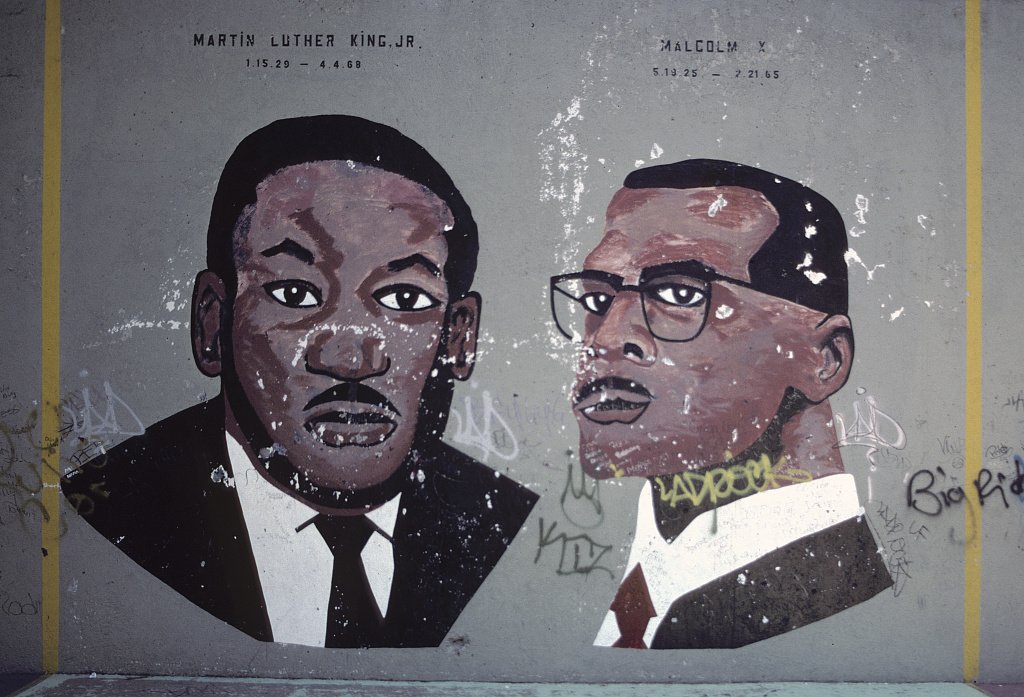
For Dialogue, Discussion, and Creation
-
Icons
In the play Malcolm asks Martin, “Do you think that people will remember us as ‘men’ and only ‘men’?” How have we remembered these historic figures and how has that memory changed from generation to generation? Did our culture need unimpeachable martyrs?
-
Expansion
What do we lose as a society when we reduce shapers of our culture and history to one-dimensional figures? How do we honor the past without oversimplifying it? Should we honor the past? As our understanding of el-Hajj Malik el-Shabazz and Martin Luther King, Jr.’s lives and philosophies expand, how can we also transform?
-
Unity
In the play, Malcolm suggests that unity is the solution to empowering the hopeless and the “living dead.” Martin agrees, but they conflict over what unity may look like and how that is achieved. In thinking about racial justice in our current context, what does unity look like? How do we move toward it?
-
Love & Anger
In Malcolm and Martin’s fictional conversation explores multiple facets of love and anger. How are these characters’ perceptions of these emotions the same and how are they different? How do they harness anger and love as they seek freedom for themselves and others?
-
Empathy
What role does empathy play in this fictionalized meeting? What might this play suggest about the role of empathy or compassion as we face today’s conflicts? Consider the characters’ interactions, but also the stories they share about their lives and experiences.
-
Futures
As audience members, we know that in his final speech Dr. King says he has “been to the mountaintop and seen the Promised Land.” Struggling up the mountain and seeing the Promised Land is about envisioning a future beyond the challenges of today. Think about some of the challenges we face today, in particular racism, poverty, and violence. What does a hopeful future look like?
-
Legacies
Just prior to this year’s Martin Luther King Day, King’s family told Americans to not celebrate the day, but to activate against changes to voters’ rights in various states. They argued that King’s legacy demands that we speak up and act. Ilyasah Shabazz, one of Malcolm X’s daughters, titles her website Living the Legacy to Empower Youth, and her work is infused with education and activism. If they were alive today, what social challenges do you think they would address?
-
Generations
Sit down with someone who was alive in the 1960’s. Maybe a grandparent or other family member. Talk to them about their memories from those days. In particular, ask them about the struggle for Black freedom. If they’ll allow you, write down some of their thoughts or record the conversation for future reference.
-
Create
The lives and work of el-Hajj Malik el-Shabazz and Martin Luther King, Jr. have inspired myriad works of art. Take an aspect of the play or lessons you’ve learned about these men and create something new. Maybe it’s a poem, song or rap. Maybe it’s a drawing. Maybe it’s a TikTok. Maybe consider the lesser told stories of individuals who supported Malcolm and Martin’s work or the struggle. Create something to explore their stories. Do it for yourself or share with others.
-
Connections
Martin and Malcolm’s conversations reference events and subjects of their time that connect to today. Voting rights, military action, right to self-defense, non-violent direct action, and citizens’ privacy to name a few. Pick an issue and explore. For example, how do Malcolm X’s views on gun rights and self-defense compare to some positions taken today? Or how does Martin’s practice of nonviolent direct action compare to current nonviolent protest methods?
-
Research
What questions did the play raise for you that may merit more inquiry? Make a list of those questions and select one to delve into more deeply. It might be something as straightforward as What is were the practices of the Nation of Islam? or more nuanced like What role did religious institutions play in the Freedom Movement? Any starting point is a good one. As always, when you research think closely about the sources of information.

This guide was created and compiled by Furaha Henry-Jones, an English professor at Sinclair Community College, with assistance from Khensani Ngwena, a Sinclair student and Community College Initiative Program (CCI) participant. Its purpose is to support learners’ fuller appreciation of the production The Meeting and to serve as a starting point for deeper inquiry into the lives of Martin Luther King, Jr., Malcolm X, the struggle for Black Freedom in the United States and their connections to our current world.
As with any information you consume, ask yourself who is telling this story? What might be their purpose? How does their knowledge and background influence the storytelling? What are the untold stories?